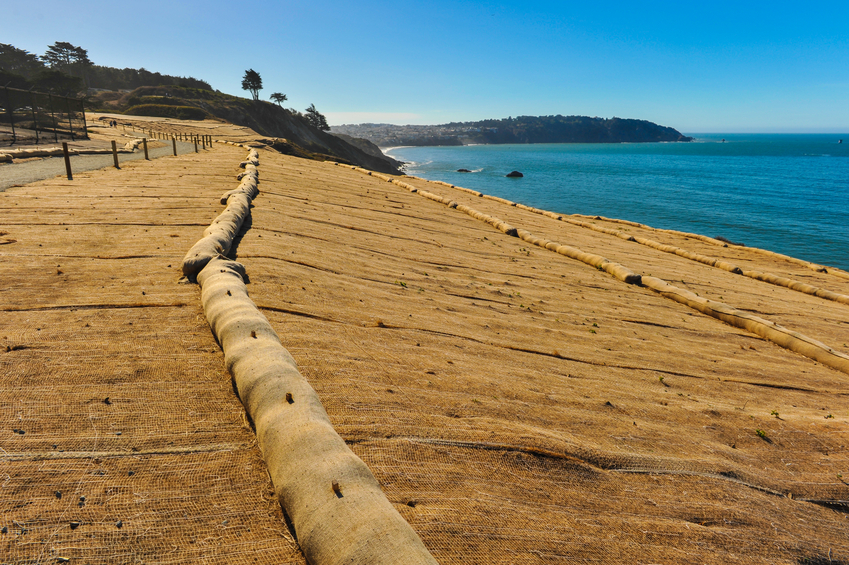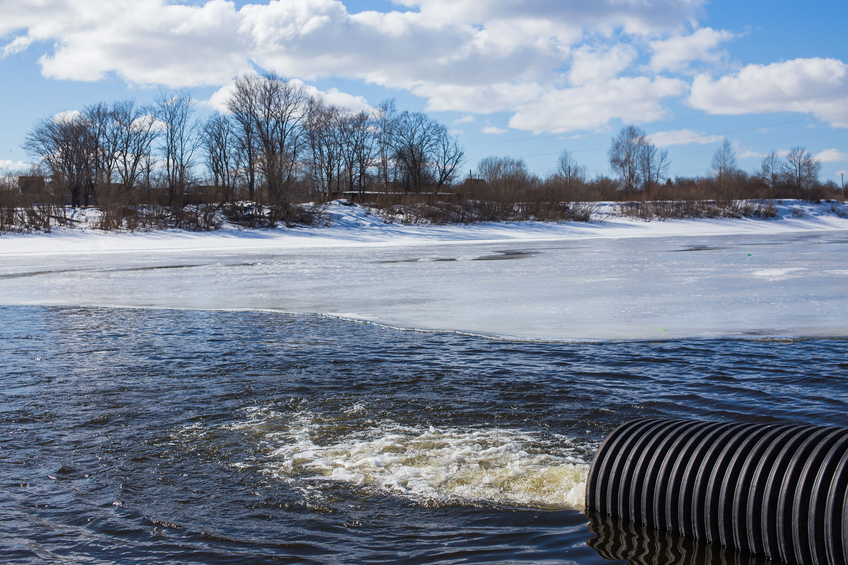District of Columbia Stormwater and Ethics 20 PDH Discount Package 1
Post Construction Storm Water Management - Non Structural BMP's (C06-001)
Developing Your Stormwater Pollution Prevention Plan (SWPPP) (C04-057)
Transportation Stormwater Permit Compendium (C07-015)
Ethical Issue: Deciding if Something is a Gift or a Bribe (LE1-007)

This online engineering PDH course addresses EPA's BMP for the protection of wetlands and aquatic ecosystems, protection of public health, flood control and more.
Erosion and sedimentation related to construction site storm water runoff can significantly affect the aquatic population and hydraulic characteristics of the receiving waters. Alterations in hydraulic characteristics of streams receiving runoff include higher peak flow rates, increased frequency and duration of bankfull and subbankfull flows, increased occurrences of downstream flooding, and reduced baseflow levels.
EPA recognizes that such alterations can be prevented by implementing an effective storm water management program. Therefore the EPA published the Storm Water Phase II Rule on
This 2 PDH online course is applicable to municipality owners and/or operators, construction contractors/workers, site developers, engineers, managers, and all other personnel involved in the implementation of runoff controls for storm water runoff from construction sites.
This PE continuing education course is intended to provide you with the following specific knowledge and skills:
- Types and methods of runoff control systems
- Applicability
- Siting and design criteria
- Maintenance and cost considerations
- Effectiveness and limitations
In this professional engineering CEU course, you need to review EPA’s Best Management Practice relating to the “Runoff Control” section of the “Construction Site Storm Water Runoff Control”. This section of the BMP addresses the following runoff control methods:
- Land Grading
- Permanent Diversions
- Preserving Natural Vegetation
- Construction Entrances
- Check Dams
- Filter Berms
- Grass-Lined Channels
- Riprap
Once you complete your course review, you need to take a multiple-choice quiz consisting of fifteen (15) questions to earn 2 PDH credits. The quiz will be based on the “Runoff Control” section of this EPA publication.
Upon successful completion of the quiz, print your Certificate of Completion instantly. (Note: if you are paying by check or money order, you will be able to print it after we receive your payment.) For your convenience, we will also email it to you. Please note that you can log in to your account at any time to access and print your Certificate of Completion.

This online engineering PDH course addresses the implementation of non-structural best management practices for post construction storm water management.
Erosion and sedimentation related to construction site storm water runoff can significantly affect the aquatic population and hydraulic characteristics of the receiving waters. Alterations in hydraulic characteristics of streams receiving runoff include higher peak flow rates, increased frequency and duration of bankfull and subbankfull flows, increased occurrences of downstream flooding, and reduced baseflow levels.
EPA recognizes that such alterations can be prevented by implementing an effective storm water management program. Therefore the EPA published the Storm Water Phase II Rule on
This 6 PDH online course is applicable to municipality owner and/or operators, construction contractors/workers, site developers, engineers, managers, and all other personnel involved in the implementation of non-structural best management practices for post construction storm water management.
This PE continuing education course is intended to provide you with the following specific knowledge and skills:
- Types and methods of non- structural bmp for storm water management
- Applicability
- Siting and design criteria
- Maintenance and cost considerations
- Effectiveness and limitations
In this professional engineering CEU course, you need to review EPA’s “Non-Structural BMP” section of the “Post Construction Storm Water Management in New Development and Redevelopment”. This section of the BMP addresses the following:
- Alum Injection
- On-Lot Treatment
- Buffer Zones
- Open Space Design
- Urban Forestry
- Conservation Easements
- Infrastructure Planning
- Narrower Residential Streets
- Eliminating Curbs and Gutters
- Green Parking
- Alternative Turnarounds
- Alternative Pavers
- BMP Inspection and Maintenance
- Ordinances for Post Construction Runoff
- Zoning
Once you complete your course review, you need to take a multiple-choice quiz consisting of thirty (30) questions to earn 6 PDH credits. The quiz will be based on this EPA publication.
Upon successful completion of the quiz, print your Certificate of Completion instantly. (Note: if you are paying by check or money order, you will be able to print it after we receive your payment.) For your convenience, we will also email it to you. Please note that you can log in to your account at any time to access and print your Certificate of Completion.

This online engineering PDH offers steps for planning how to prevent and contain stormwater pollution. It offers a step by step guide on what should be included in the plan, as well as helpful tips for how the plan can be maintained, adhered to, and exceeded in order to ensure a high level of quality.
Stormwater runoff is water from rain or snowmelt that does not immediately infiltrate into the ground and flows over or through natural or man-made storage or conveyance systems. When undeveloped areas are converted to land uses with impervious surfaces such as buildings, parking lots, and roads, the natural hydrology of the land is altered and can result in increased surface runoff rates, volumes, and pollutant loads.
This course provides useful tips about maintaining a SWPPP, as well as examples of and foresight into what can go wrong with various different kinds of materials which are commonly found at industrial sites. This includes solids, liquids, and waste. It also provides useful information on how to effectively and efficiently handle stormwater discharge in the event that control measures fail, and information on monitoring pollutants in stormwater discharge.
This 4 PDH online course is applicable to industrial, civil, environmental, and sustainability engineers as well as others interested in gaining a basic understanding about developing a stormwater pollution prevention plan.
This PE continuing education course is intended to provide you with the following specific knowledge and skills:
- Understanding what causes stormwater pollution and its effects on the environment
- Learning how to prevent and contain stormwater pollution
- Learning how to develop a stormwater pollution prevention plan in order to be in compliance with a National Pollutant Discharge Elimination System permit
- Learning how to analyze the particular pollutants in your stormwater discharge
Upon successful completion of the quiz, print your Certificate of Completion instantly. (Note: if you are paying by check or money order, you will be able to print it after we receive your payment.) For your convenience, we will also email it to you. Please note that you can log in to your account at any time to access and print your Certificate of Completion.

This online engineering PDH course presents examples of different permitting approaches that the U.S. Environmental Protection Agency (EPA) found in a nationwide review of National Pollutant Discharge Elimination System (NPDES) permits that specifically address linear, department of transportation (DOT) municipal separate storm sewer systems (MS4s).
Stormwater discharge is an issue which requires both proactivity and reactivity; the MS4 permits provide a framework within which projects can adhere to practices aimed at reducing the amount of pollutants found in stormwater discharge which makes its way into the environment.
This course features useful information and excerpts from the MS4 permits of many different States. It uses these excerpts to illustrate key points regarding each section of the packet. It also features broader tips which apply to general projects which may be susceptible to pollutants in stormwater discharge.
This 7 PDH online course is applicable to civil, environmental, stormwater management and sustainability engineers as well as other technical personnel interested in learning more about MS4 permit regulations.
This PE continuing education course is intended to provide you with the following specific knowledge and skills:
- Understanding the key idea behind MS4 permit requirements
- Familiarizing with the establishment of the stormwater management program
- Learning about the permit requirements for facilities, roadways and storm sewer infrastructure
- Familiarizing with the Project Development and Active Construction requirements
- Familiarizing with the various Best Management Practices of the different DOTs
Upon successful completion of the quiz, print your Certificate of Completion instantly. (Note: if you are paying by check or money order, you will be able to print it after we receive your payment.) For your convenience, we will also email it to you. Please note that you can log in to your account at any time to access and print your Certificate of Completion.

This online engineering PDH course will establish, through the presentation of many examples, the principles of distinguishing between a gift and a bribe.
The federal government has formulated detailed rules covering gifts given to executive-branch employees in many situations. The rules are published in the Code of Federal Regulations (CFR) and are illustrated through many examples. Even though the examples are intended for government employees (many of whom are engineers), they also apply to private-sector engineers in similar situations. This course presents selected CFR examples that furnish guidance on the ethics of gift giving in situations that are especially relevant to engineers.
This 1 PDH online course is intended for engineers seeking guidance on distinguishing between ethical gift-giving and bribery.
This PE continuing education course is intended to provide you with the following specific knowledge and skills:
- Familiarizing with definitions of a bribe and a gift
- Knowing the bribe status of a gift based on a personal relationship
- Understanding the conditions under which gifts to spouses are acceptable
- Knowing the need to avoid even the appearance of a gift being a bribe
- Recognizing when gifts involving free attendance at meetings and conferences are acceptable
- Understanding the importance of the cumulative effect of receiving even small gifts on a periodic basis
- Learning the importance of gifts received when on assignment rather than outside of work
Upon successful completion of the quiz, print your Certificate of Completion instantly. (Note: if you are paying by check or money order, you will be able to print it after we receive your payment.) For your convenience, we will also email it to you. Please note that you can log in to your account at any time to access and print your Certificate of Completion.